Matter Around Us | Chapter 9 | 8th Science - Elements | 8th Science : Chapter 9 : Matter Around Us
Chapter: 8th Science : Chapter 9 : Matter Around Us
Elements
Elements
Elements are everywhere. They are
the building blocks of everything on Earth: pencil, desk, mountains, car, book,
etc. Do you know that when you are breathing you are actually inhaling air? The
air you breathe is made up of many elements like oxygen, nitrogen and argon.
An element is a pure substance that
cannot be broken down by chemical methods into simpler components. For example,
the element gold cannot be broken down into anything other than gold. If you
keep hitting gold with a hammer, the pieces would get smaller, but each piece
will always be gold.
Elements consist of only one type of
atoms. An atom is the smallest particle of an element that still has the same
properties of that element.
All atoms of a specific element have
exactly the same chemical makeup, size, and mass. Each atom has an atomic
number, which represents the number of protons that are in the nucleus of a
single atom of that element. There are a total of 118 elements. Many elements
occur naturally on Earth; however, some are created in laboratory by
scientists.
1. Symbols of Elements
A symbol is an image, object, etc. ,
that stands for some meaning. For instance, a dove is a symbol of peace.
Similarly, we denote mathematical operations by symbols. For example ‘+’
denotes addition; ‘–’ denotes subtraction etc. In the same way in chemistry
each element is denoted by a symbol. Writing out the name of an element every
time would become too troublesome. So, the name of an element is represented by
shortened form called as symbol. Let us learn the brief history of symbols of
elements.
a.
Greek Symbols
The symbols in the form of
geometrical shapes were used by the ancient Greeks to represent the four basic
elements around us such as earth, air, fire and water.
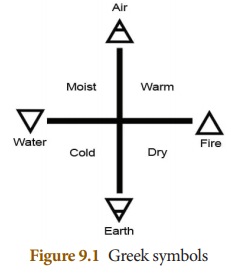
b. Alchemist Symbols
In the days of alchemists, different
materials that people used were represented by different symbols while they
tried to change less valuable metal into gold. That process was called alchemy and the men who did this work
were known as alchemists.
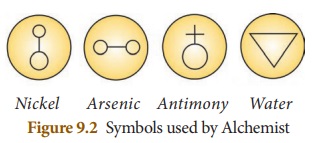
c.
Dalton Symbols
In 1808, John Dalton, English
scientist tried to name various elements based on pictorial symbols. Those
symbols are difficult to draw and hence they are not used. It is only of
historical importance.
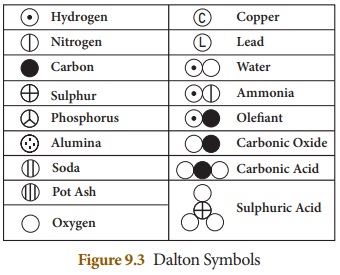
d.
Berzelius Symbols
In 1813, Jon Jakob Berzelius devised
a system using letters of alphabet rather than signs. The modified version of
Berzelius system follows under the heading ‘System for Determining Symbols of
the Elements’.
e. Present
system for determining symbols of the elements
1. The symbols of the most common
elements, mainly non-metals, use the first letter of their English name.
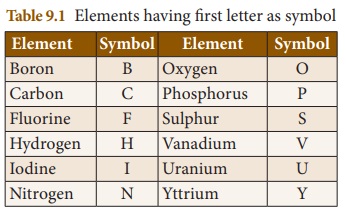
2. If
two elements have same first letter, then the first and second letters of the
name are used as symbols. The first letter is in uppercase and the second
letter is in lowercase.
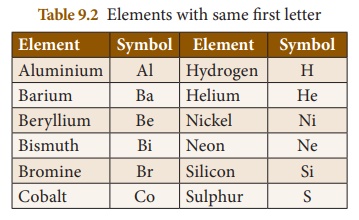
3. If
the first two letters of the names of the elements are same, then the symbol
consists of first letter and second or third letter of English name that they
do not have in common.
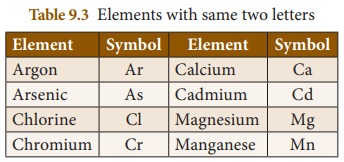
4. Some
symbols are used on the basis of their Greek name or Latin name of the
elements. There are eleven such elements.
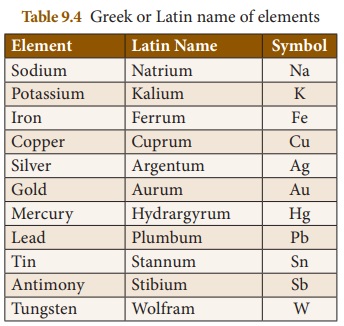
5. Some
elements are named using the name of the country / scientist / colour /
mythological character / planet.
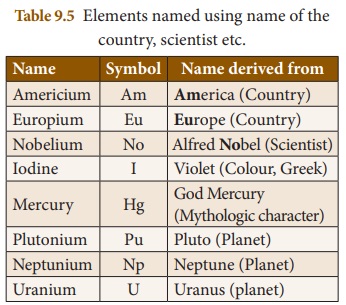
2. Writing
the Symbols
While writing the symbol for an
element, we should adhere to the following rules.
1. If the element has a single
English letter as a symbol, it should be written in capital letter.
2. For elements having two letter symbols, the first letter should be in capital followed by small letter
Related Topics